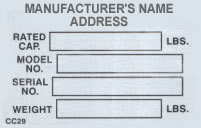Back to Product Category
Engineering
Matters – Below the Hook Lifting Devices |
Below
the Hook Lifters are those helpful pieces of equipment that provide a connection
point between the crane and
the load being lifted. They can be structural mechanical lifting devices,
vacuum lifters, magnets, and grapples. In order
to provide direction regarding the design, marking, installation, inspection
testing and much more, the American Society
of Mechanical Engineers (ASME) has developed standards that apply specifically
to these types of devices.
In 2006 The American Society
of Mechanical Engineers released a new standard, ASME BTH-1 in order to
provide
clarification in regards to structural design requirements stated in ASME
B30.20. The revision to ASME B30.20 that
fully references ASME BTH-1 was published in January 2007 and became effective
January 16, 2008. This new
standard applies to all new product manufactured after January 16, 2008
and does not require that existing below the
hook lifting devices be reworked to adhere to the new standard requirements.
ASME B30.20 provides detailed
information on the classifications, marking, construction, installation,
inspection,
testing, maintenance, and operation of below the hook lifting devices.
ASME BTH-1 provides detailed information
on the design criteria of below the hook lifting devices. Here are some
Quick Facts you need to know about below
the hook lifting devices
|
|
|
|
|
|
|
Quick
Facts |
| Marking: Below the hook lifting devices shall be marked with at least: |
|
•
Manufacturer’s name and address
• Serial number
• Lifter weight, if over 100 lbs. (45 kg)
• Cold current (amps) (when applicable)
• Rated voltage (when applicable)
• Rated load
• ASME BTH-1 Design Category
• ASME BTH-1 Service Class
• Product Safety Labels |
|
|
|
|
|
|
 |
|
|
|
|
|
 |
|
|
|
|
|
|
|
|
|
|
|
|
|
|
|
| Service
Class: Will determine the approximate life of a lifter: |
|
| Service
Class |
Load Cycles |
| 0 |
0 - 20,000 |
| 1 |
20,001 - 100,000 |
| 2 |
100,001 - 500,000 |
| 3 |
500,001 - 2,000,000 |
| 4 |
Over 2,000,000 |
|
|
|
|
|
| Installation: Lifting Equipment shall assembled and installed in accordance with the
manufacturer’s instructions.
Operator Training: Lifters
shall be operated in accordance with manufacturer’s operating instructions
and by
personnel who have received instructions in proper Operating Practices.
Inspection: The lifter
shall be visually inspected by or under the direction of an appointed
person on a daily or weekly
schedule and by the operator prior to each lift.
Maintenance & Repairs: A preventative maintenance program should be established for each
lifter. Repairs shall
be in accordance with ASME standards. Replacement parts shall be at least
equivalent to the original manufacturers
specifications.
|
|
|
|
| Operating
Practices:
|
•
Do inspect the lifter prior to each lift.
• Do read and understand all operating instructions.
• Do watch carefully during the lift.
• Don’t use a lifter with an out of service tag.
• Don’t use a lifter for any other purpose than it was designed.
• Don’t obscure markings or use a lifter when the markings are
not legible or missing. |
|
|
|
| Handling
the Load:
|
•
The lifter shall not be loaded in excess of its rated capacity.
• The lifter shall be applied to the load as directed by the manufacturer.
• All loads shall be accelerated and decelerated smoothly.
• The operator or other personnel shall not place themselves or any
part of their bodies beneath suspended loads. |
|
|
|
This
information is a very brief summary of what you need to look for in order
to make an informed decision regarding
the Lifting Devices you are considering or have already purchased. For more
details contact us. |
|
|
|
Standards, ASME Standards,
American Society of Mechanical Engineers Standards, Below the Hook Lifting
Devices,
Hook Suspended Lifting, Vacuum Lifter, Suction Lifting, and Vacuum Lifting
Equipment from your source for material
handling equipment. |
Back to Product Category
|



